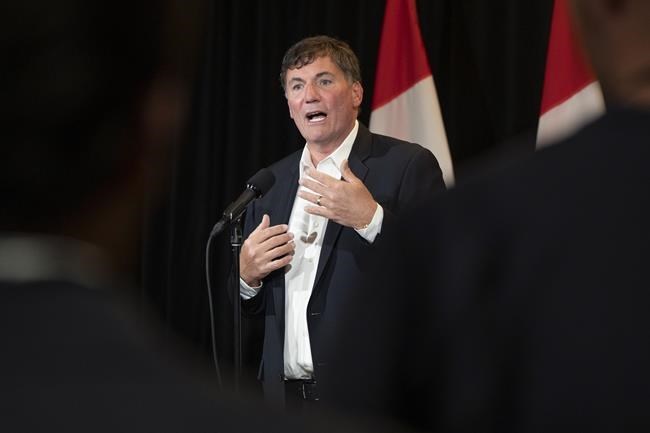OTTAWA — The Canada Border Services Agency has bolstered the infrastructure around 11 ports of entry to Canada as part of the government's response to border blockades associated with the "Freedom Convoy" protest last year, Public Safety Minister Dominic LeBlanc said Thursday.
In a letter addressed to the prime minister, LeBlanc provided a six-month update on work underway to respond to recommendations from the federal inquiry into the government's use of the Emergencies Act last year.
Prime Minister Justin Trudeau invoked the legislation last year in an attempt to put an end to the weeks-long "Freedom Convoy" protests that blockaded streets in downtown Ottawa and several U.S. border crossings.
It was the first time the law, which replaced the War Measures Act, was used since its creation in 1988.
Commissioner Paul Rouleau put out a final report on Feb. 17, after more than 300 hours of testimony, and issued 56 recommendations on improving the response to large-scale public order emergencies.
LeBlanc is expected to provide the government's full response to Rouleau's findings in February 2024.
In the meantime, LeBlanc's six-month update focused on the work that's been undertaken in response to Rouleau's recommendations so far, and highlighted progress by his department and others to strengthen the security of critical infrastructure.
He pointed to infrastructure improvements at 11 border crossings, but was not specific about what those improvements are. A request for more information from CBSA wasn't immediately returned.
The Public Safety Department also plans to renew its strategy for critical infrastructure with the help of other agencies and departments, LeBlanc said. The work is expected to be complete in 2024.
This summer, Transport Canada began talks with provinces, territories, business groups and Indigenous organizations to co-ordinate on how to handle serious disruptions to key trade and transportation routes.
Upwards of 15,000 protesters arrived in Ottawa last year with a convoy of big-rig trucks to protest COVID-19 public health measures and oppose Trudeau's government.
The protesters refused to leave, and blocked downtown and residential streets for weeks in what local police and politicians called an "illegal occupation" of the capital.
Spin-off protests blocked border crossings in Alberta and Ontario, cutting off important trade routes between Canada and the U.S.
Though border blockades were largely cleared away by the time Trudeau invoked the Emergencies Act, Rouleau deemed the government justified in using the extraordinary legislation in an attempt to put a stop to the protests.
However, he said, the events that led to the law's invocation were likely preventable.
The Emergencies Act allows the government to temporarily suspend civil liberties and the division of powers under the Constitution. It was used during the protest by the government, banks and police to freeze the bank accounts of protest organizers and supporters and ban people from assembling on the streets of Ottawa near Parliament or around border crossings.
LeBlanc's letter said the key objective in preparing the government's response to the inquiry report is "to maintain public trust and confidence in the ability of police and all orders of government to work together to keep Canadians and our communities safe and secure."
Rouleau's recommendations included improvements to intelligence-sharing and communication between police agencies.
He also called for national standards on how major national or interprovincial events are handled between governments and their respective police agencies.
The RCMP is still considering the best way to respond to the recommendations as well as those from the Mass Casualty Commission, which called for a renewed approach to managing crisis in light of the April 2020 mass shooting in Nova Scotia.
Meanwhile, the federal government says it is leading talks to improve co-ordination with provinces, territories and cities.
"Discussions are taking place at existing federal, provincial and territorial engagement tables on policing, public safety, justice and transport to address recommendations in areas of shared jurisdiction," LeBlanc said in his letter.
Given that some recommendations are specific to Ontario, LeBlanc said he's written to the Solicitor General of that province to get a better idea of what the provincial government is planning.
In response to Rouleau's suggestion to further research cryptocurrency, which was used as a way to fundraise for the protest, the finance department has launched a legislative review of the financial sector.
LeBlanc said the department wants to adapt to the "increasing digitization of money" to maintain stability and security in the financial sector.
The government is still considering Rouleau's suggestions to improve the Emergencies Act itself, and the process for the inquiry that will follow if the legislation is ever invoked again.
This report by The Canadian Press was first published Aug. 31, 2023.
Laura Osman, The Canadian Press

